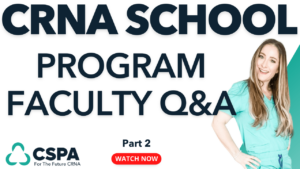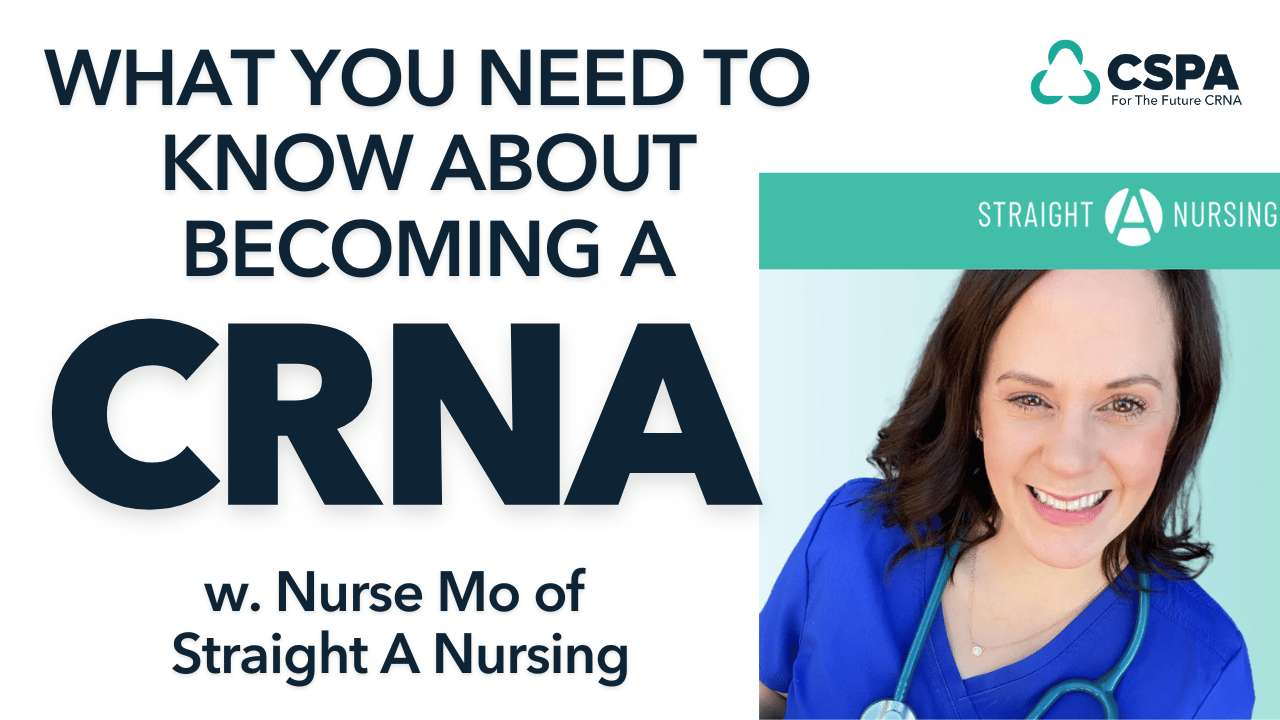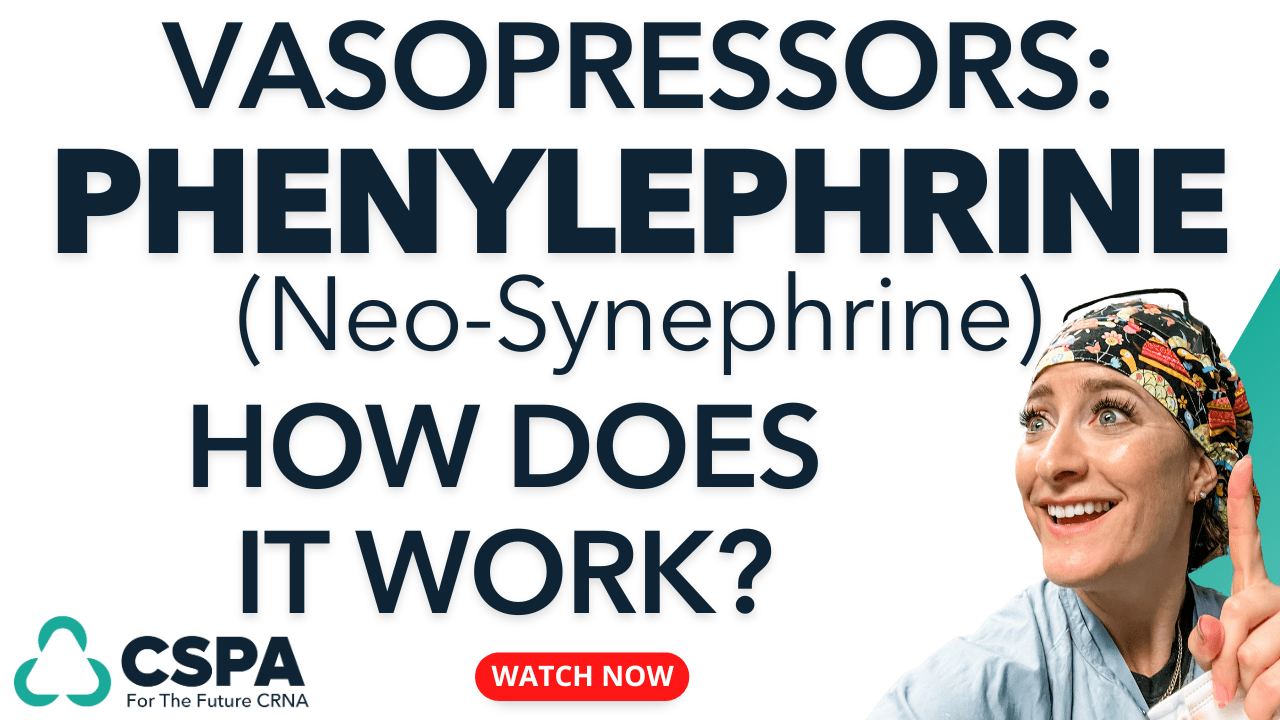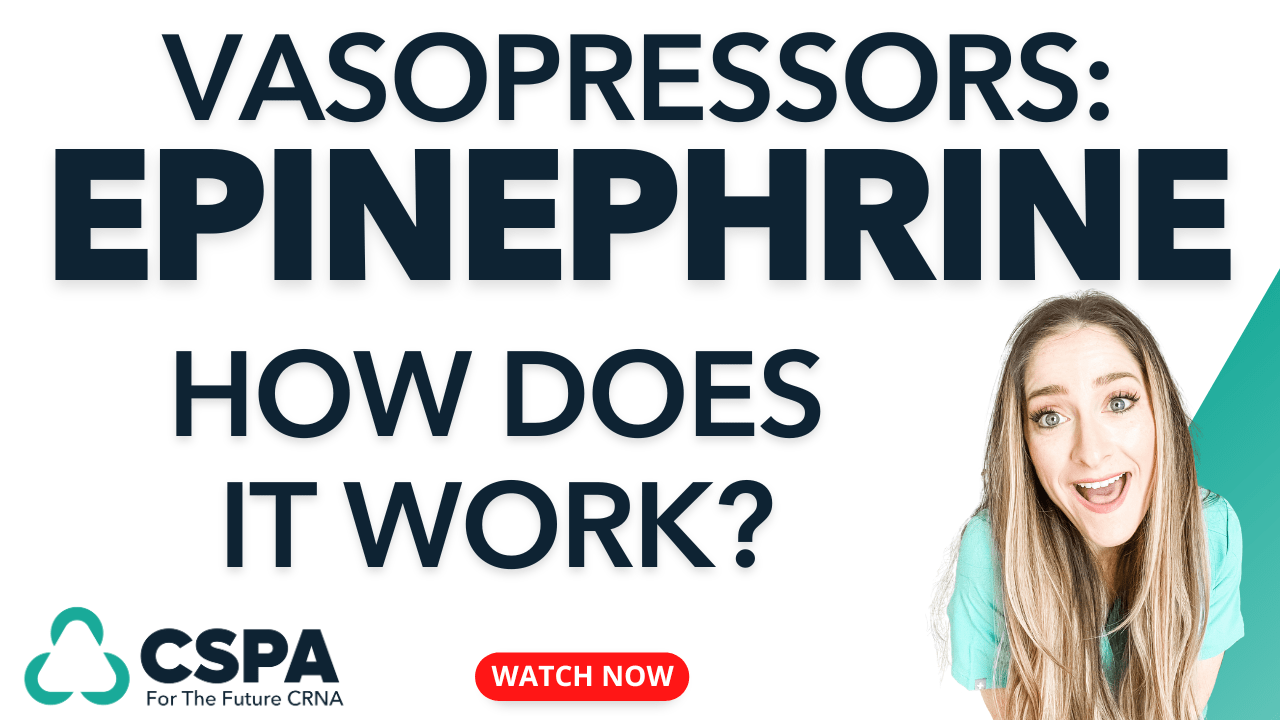
Get Your Free CRNA School Interview Prep Guide
Free CRNA School Interview Prep Guide Click Here
To succeed as a CRNA, align your passion with preparation, embrace mentorship and resources, and strive to thrive. Explore CRNA programs in the second part of our CRNA Faculty Q&A series. In this episode, we continue our discussion on how to get into CRNA school with advice from CRNA program faculty themselves. Join us as we explore the multifaceted landscape of CRNA program interviews, mentorship, and aligning personal values with program values. This time, we’ll talk about how to show your experience without being overwhelming, and the importance of community engagement in the CRNA field. We explain how to master the art of storytelling by creating a captivating narrative that showcases your experiences and goals while still emphasizing your enthusiasm for learning and personal development. We also touch on mentorship, seeking resources, being resourceful in your path to becoming a CRNA, and more. Tune in now!
Thousands of nurses have gained CRNA school acceptance with CRNA School Prep Academy. Join today for access to all of the tools proven to accelerate your CRNA success! Click here:
https://crnaschoolprepacademy.com/join
Join the CSPA email list: https://www.cspaedu.com/podcast-email
Join the Free Facebook Community here! https://www.facebook.com/groups/crnaschoolprepacademyfree
Book a mock interview, resume or personal statement critique, transcript review and more: www.teachrn.com
—
Watch the episode here
Listen to the podcast here
CRNA Program Faculty Q&A Part 2
If you are a return reader, I’m happy to have you back. If you’re new, I’m so excited you found the show. This is part two of a faculty Q&A that was part of our annual conference. I do have some announcements on that that I will share here in a minute. This is valuable advice directly from CRNA faculty that I’m sharing with you. If you have not read part one, I encourage you to go back to that episode. I do release these in sequels, so that way, you don’t have to dig too far back in the library to find part one. You’ll be fine reading the part two first, and then part one. It’s not like you have to read part one prior to reading part two. You can rest assured that you’re okay, but I want to make sure you know that part one does exist in case you enjoy this episode.
Some announcements is that we are looking at trying to do an in-person conference. We don’t have a set date for that yet. However, it is looking like probably spring of 2025. 2024 will be a low-key year. We’re probably still going to do some virtual conferences, but it’s probably going to be on a much smaller level or at least maybe more guidance and specific speakers from community leaders within the community. We will definitely keep you posted on that. We will probably go all out and have a very large in-person conference in 2025, which I’m excited about and cannot wait.
I’m so excited. I get to meet a lot of you at NTI. If you haven’t been to the National Teaching Institute through the AACN, they typically do their conference every May. We have made it in the last few years. I don’t plan on changing anything, so I hope to get to meet you there, but I sure as heck also hope I will get to see you at our in-person conference in the near future as well. Without further ado, let’s get into this faculty Q&A part two. We are going to start this episode by discussing pass-fail applicants. What does it mean to be a pass-fail applicant and how do schools see these types of applicants?
Pass – Fail GPA Applicants
Out of all four faculty who discussed this question, they all gave a very similar response, which was good to hear that they typically look at applicants holistically. They always break down your GPA into two GPAs, your overall GPA and your science GPA. If you have a pass-fail Nursing degree, typically you’ll still have science grades like Chemistry, Anatomy, and Pathophysiology. Also, some type of math course, whether that be Algebra or Stats. Some nursing programs require them, some don’t. Also, Chemistry and things of that nature. Those are your hard sciences. They always take that GPA separately. Even if your pass-fail GPA is 3.0, they will look at, “What was your science GPA when you took those courses?”
They do look at you holistically. However, ultimately, the reason why pass-fail could be so detrimental is because it can lower your overall GPA, but all of them assured that they do look at you holistically and try to break up your GPA into different parts. They weigh your science GPA very heavily, so that’s a real key indicator right there. If you have some work to do in your science GPA realm, focus on that, especially if you have a pass-fail BSN-type situation going on. They also encourage you to reach out to the institution to have them review your transcripts. Some schools will do that for you. Some won’t, but it’s worth asking. Some of them do.
Even mentioning stuff like this on your personal statement, one of them suggested, “Why don’t you explain the rigor of the program? If you get the interview, you can express what it meant to go to a pass-fail program and what kind of experience would you get.” It is essentially addressing the elephant in the room. If you’re worried about that being a problem and you suspect that they may be questioning your experience and the rigor of your undergrad program because it was pass-fail, then you should address it and reassure them of the type of experience you got.
There were maybe some unique challenges that you faced that you wouldn’t have had otherwise if you’d gone to a more traditional path. Whatever that may be, it’s addressing it out in the open. The other big takeaway is to make sure you’re assessing your science GPA to at least make sure that that is strong. I did an entire episode with Sabrina who had a pass-fail BSN degree. She got into CRNA school. This was a while back, so I should look at these things up before I come on the show. I’m always been bad about pre-planning this stuff. I always think about it on the spot.
If you search through my old episodes, you will find one that I did with Sabrina on pass-fail. Apple is good enough search-wise if you type in “pass-fail.” This is also on YouTube, Getting into CRNA School with a Pass|Fail BSN. I encourage you to tune in to that entire episode to hear how Sabrina navigated this issue. That’s enough about pass-fail. Next, “Is precepting seen as a leadership role?” Yes, it most certainly is. Here are some of the caveats about precepting.
Leadership Roles For CRNA School
I had a couple of programs say that it was important for them to see leadership embedded in the ICU. Meaning, there are other things you can do for leadership roles such as volunteering and being involved in different types of organizations. That’s all great, I’m definitely not discouraging that, but they like to see some type of leadership roles within your ICU setting, whether that’d be unit council or working on a QI Committee or Quality Improvement Committee, being a charge nurse, preceptor, and things of that nature. It shows your involvement within your unit. They like to see that.
Preceptorship definitely is great. More importantly than checking the box that you were a preceptor, they want to know, “What did you get out of it? How does that improve you as a bedside nurse or as a clinician? How will it prepare you better for CRNA school? How will it make you better in CRNA school?” A lot of students have said to me, “I’m able to explain myself better and have a better understanding on what it is I’m doing because I now have to explain it to someone else who’s learning.”
One of the best ways to learn is to educate. Educators love learning. They love learners too. The reason they go into education is because they themselves are forced to always be actively learning. Guess what? Similar to why I love mentoring, I learn from you and I enjoy that. It lights me up and it’s exciting to hear from you and to learn from you because you teach me so much.
That is essentially what a preceptor is doing. You are actively learning with your preceptee. That right there could be how you could display the value you get from having that leadership role within your ICU setting. If that’s not what you jive with, pick other reasons you can enjoy and get value out of precepting, but that’s one that came to mind that would be a relatively good way to explain the value you get from that type of role.
It’s a very common leadership role. How does this help you develop as an ICU leader or an ICU nurse? If you think about it, it’s how well you can communicate. I spoke to the value of your experiences in the ICU as far as leadership roles go and what it has done to not only help you as an ICU nurse, but how is it going to transition and help you in a CRNA program. They like to see that thought process going with how would that type of experience transition into the role of a CRNA and even as a nurse anesthesia resident and help you thrive in CRNA school. Preceptorship most definitely was unanimously said, “Yes, that’s a great experience,” but you have to understand why that is for you particularly.
Preparing For CRNA School
The next question is dealing with task anxiety or Imposter syndrome. This is a very common experience that the vast majority of students, if not all, are going to experience at some point during their CRNA journey. The big takeaway for this or the hit home is having an understanding of what you’re in for, paying close attention to the time commitment and studying that’s going to take place in anesthesia school versus what maybe you’re used to or more accustomed to. Ultimately, they said preparation is the best antidote for this.
The best way to combat some of those anxieties and fears is to adequately prepare yourself for what’s ahead. This can come from financial planning or support planning, as far as gearing up all your friends and family for what’s going to be coming. This could be education. This could be talking to a current SRNA and seeing how they navigated the living arrangements and things of that nature. It’s getting prepared for what to expect, which is what CRNA School Prep Academy does so well. It helps prepare you. You’ll never feel 100% because there’s always going to be part of you that thinks, “I don’t know, there’s so much to know.” That’s life. You’ll always feel that way no matter what it is in life.
The best way to combat some of the anxieties and fears about starting CRNA school is to adequately prepare yourself for what's ahead. Click To TweetYou have to trust the fact that if you have been invested in this journey for years and you’ve done the best you can to be prepared, you’re going to be okay. They designed these programs for you to be successful. If you have done the legwork yourself to do as much as you can to help yourself, you’re resourceful already. You’re going to continue to be resourceful. It’s about developing that resourceful backbone of, “When do I need help? I don’t feel good. How can I help myself? What can I do differently next time? How can I tweak this technique? How can I do something that’s going to work better and more efficiently?”
Being resourceful is a key characteristic of someone who’s going to be completely okay and it may not always feel that way because you’re still going to be stressed about what’s to come, but you’re going to be okay because you’re going to figure out a way to move forward. In order to get to the point where you’ve gone into school, you typically have to have been resourceful already. Be reassured that if they picked you, they saw that in you. Maybe you don’t see it yourself, but you need to believe that it’s there. Don’t neglect your own emotions. I hear this all the time, and I don’t think it’s meant to be ill advice.
People portray all the time. That’s human nature to try to be relatable to one another. What I mean by that is to say, “You’ll be fine. Just enjoy and relax before you start your program.” I do agree that’s what you should be doing, but I don’t think you should neglect some anxiety or fears around, “I feel very weak here. I feel like I need more of this.” If you feel that way, even if someone gives you that advice, lean into how you feel. Don’t take them at face value because you’re not them. They’re not the ones doing the work, you are.
If you feel like, “I don’t feel ready in this area. I haven’t had chemistry in over fifteen years. I think I’m in for a rude awakening, even though they tell me to relax and enjoy myself, I worry I’m going to flunk out.” Listen to that gut instinct and do some extra legwork for yourself to help yourself because again, if you don’t pass that course and they gave you that advice, there’s no sweat off their back. It’s sweat off your back. Taking ownership for what you feel you need is key in this journey and not taking someone else’s advice, even though it’s not meant to be ill advice given the wrong way, it’s just because they’re different. They’re not you.
There are some people who are like, “I’ve been studying Khan Academy for the last decade because I think it’s fun.” They’re like, “I didn’t do anything. You’re totally fine.” You could be like, “I haven’t looked at a book since my undergrad years.” Maybe you’re not going to be okay like that person because they think it’s fun to study chemistry and you don’t. Know what you have in your own toolbox and what’s rusty in your own toolbox. Listen to that gut intuition on what you need and make sure you’re fulfilling it. Don’t take anyone else’s advice for what it is. Maybe guidelines but it’s not you, it’s not who you are, and what you need. Just listen to your gut when it comes to that.
Study Techniques & Time Management In CRNA School
They also agree that things like time management and study techniques are going to have to be tweaked. You may not have ever adjusted those study techniques since undergrad and you may not have not ever experienced a type of challenge that you are getting ready to embark upon grad school. I’ve said this before, but the biggest challenge with what you’re getting ready to embark upon as far as academically is the pace. Not the concepts, it’s the pace. I’ll say it again. It’s how fast. Not the concepts. The concepts are all things that are pretty standard, in my opinion. Some are more complex than others and way more in-depth than what you’re used to, but they go fast and you’ve got to keep the pace.
A lot of our old study techniques in school and you thought that was fast, that’s like snail speed. It was like you can take a whole week to read a chapter. No. Try reading like six chapters in a night or maybe not in a night, but it sometimes feels that way. Definitely six chapters in a week where I don’t know if you ever hit that many chapters, and that’s for one subject. You have multiple subjects. That’s just for one subject, not all of your classes. I feel like nursing school is way slower than that. You maybe get 1 or 2 chapters a week, maybe. I don’t know. I don’t even remember needing to read my nursing books, but I don’t think I ever needed to. I just read my notes.
You’re going to have to read your anesthesia books for sure. It’s a different caliber and different pace than what you’re used to. Study techniques as far as efficiency is the key. Making flashcards is probably not going to be the most efficient way to use your study time. It might work for you to remember things, but you’re going to get way far behind. You’re never going to keep up and you’re going to stress to create a vicious cycle. You have to have more than one tool in your toolbox to pull out in CRNA school when it comes to study techniques. Also, working with the techniques that speak to your strengths and understanding what those are.

CRNA Faculty: You have to have more than one tool in your toolbox to pull out and CRNA school when it comes to study techniques.
We had this one school that said they give their students a learning assessment when they start their program, which would be a great idea to understand how you learn and know that prior to starting school. Unfortunately, sometimes in undergrad, you don’t ever have to assess that because you’re not challenged enough to need to assess that. I was very fortunate to be challenged enough in undergrad to need to assess my own studying skills because I was not doing well. I was able to figure that out. I never struggled with that in grad school because I did struggle with that in my undergrad to the point where I got rejected from the College of Nursing.
I see students who get into nursing school and get all the way through. When they get to grad school, they’ve never taken the time to tweak their learning habits. For the first time in their adult career now, they’re like, “What do I do?” I am actually very grateful that I had that struggle early on because I was not faced with it again. By the time I got there, I had already figured it out. Just take some time. Whether you’re taking an extra chemistry course and a pathophysiology course before you even apply to CRNA school, I encourage you to use that time to explore study techniques before you start your program. Even things like the CCRN and things like that, you can explore study techniques while you’re studying for those exams to see if there’s some other more effective or efficient way for you to study.
They also mentioned things like knowing when you need help, meaning to utilize the services that your school offers. It could be the writing center or the student success center, or counseling of any kind. Again, not being afraid to say “I need help” is a big key to lessening that imposter syndrome and anxiety, because the ownership is not all on you. It’s a group effort or a team effort knowing that you’re not alone, that you are in this with your classmates and that relieves a lot of this pressure. Imposter syndrome comes from you creating an immense amount of pressure to be perfect. There’s no such thing as perfection in life. You are not perfect. You will need help. You will not be able to do it all.
Something about Imposter syndrome is accepting the fact that you are very imperfect and you’re going to need help along the way because the more pressure you’re putting yourself to never make a mistake and know everything you have to do just creates this anxiety and stress that creates this Imposter syndrome, “Maybe I’m not good enough.” Nobody’s good enough if you look at it that way. There’s no such thing as anyone who’s good enough. Everyone does the best they can by utilizing the resources they have at their fingertips. Sometimes finding those resources take some digging. Don’t be afraid to raise your hand, ask questions, and seek out things that you can do to help yourself. Know that you’re your own best advocate and you have to speak up.
CRNA DNP Project Ideas
Let’s move on. Some schools are asking for their candidates to come in the interview, or even in their personal statements, to write about the DNP/DNAP project ideas. Unanimously, all of the four faculty that were on this Q&A said, “That seems a little ridiculous. We don’t do that because how could you possibly know anesthesia concepts well enough at this point to have a good handle on what you’re going to do your DP project on.” There are schools who are asking this. They all unanimously agreed that maybe they’re not looking for the topic per se, but they’re looking to make sure that you understand the concepts of a quality improvement project. They’re looking for whether you understand the difference between translational and primary research.
If your school does ask these types of questions, I encourage you to research translational and primary research to know the difference between the two and understand what the DNP project will be about. If you’re a part of CSPA, we have an entire course on DNP project that was done by Richard Wilson who’s a CRNA faculty to help guide you in that. It’ll give you good ideas. I also shared a lot of great links for the AANA who also does poster presentations on their website. You can go and look at what other students have done. There are ways to be prepared for this, both in the interview and on your personal statement.
Also, at the end of the day, they said that it was probably understanding what’s going to be in store for you as far as what to expect versus nailing the perfect concept. Don’t worry too much about the perfect idea or perfect concept, but understand what kind of outcome you’re trying to achieve by doing this type of research project.
Emotional Intelligence & Clinical Interview Prep
What are the thoughts on bringing CCRN results and understanding the CCRN results? Some schools will want to know your CCRN results. They’ll want to know what your score was. Some of them even ask to have the breakdown of the categories and how you scored. This particular person or school said that while they do require the CCRN, meaning, “Did you pass?” They don’t necessarily break down the score and look at the score of your CCRN because they have their own CCRN-style test, which they do look at how you did.
I’ve noticed a trend. Not all schools have this, but a lot of schools have their own CCRN-style test on top of the CCRN because they do want to see how you score in certain areas. Whether your school asks for your score or not, you may still be assessed in your critical care knowledge base through a CCRN-style test that they have made and will give you. They may hit you all with emotional intelligence type kind of questions, but you could still be in the store for this CCRN-style written test.
When I hear students say, “They only test me on EI questions, I don’t have to prepare my clinical questions.” That’s a big no-no, I’ve never encouraged that because you never know- their interview panels change from year to year. A new program director could come in and completely change their style. Yes, they care about EI and that’s a very important topic, but it doesn’t mean they wouldn’t give you and administer a CCRN-style test.
It’s not going to hurt you to brush up on your ACLS and critical care knowledge prior to your interview, even if you know they’re going to mostly hit EI questions. I don’t think there are any shortcuts around doing that. It’s only going to help you in the future when you start your program and to have a better understanding of some of these concepts anyway. Some of them administer their own. Going into EI, Emotional Intelligence, this is a hugely focused-on area because it’s been proven time and time again statistically that students who have higher EI, Emotional Intelligence, tend to do better and tend to graduate more often, and also with higher first-time board passing rates.
It's been proven time and time again statistically that students who have higher emotional intelligence tend to do better. They intend to graduate more often and also have higher first-time board passing rates. Click To TweetThey’re hyper-focused on this now. It’s becoming more of a common thing for them to assess. A lot of them are incorporating EI into their curriculum with their courses, guest speakers, and things of that nature. A lot of them are administering EI exams, like the CCRN exam, a lot of them are administering their own EI exam prior to even interviewing you, so they can see how you score. I know one that I hear a lot is called Casper, but there are other ones out there. Knowing that they are assessing this more so sometimes in the 5, 10, to 15-minute interview you’re going to have with them. It’s important to holistically make sure that your critical care knowledge is strong, as well as you understand who you are and where you stand with a lot of things.
I know this is very overwhelming to hear. I always stress that when you prepare clinically, you should be doing that every day you work in the ICU. It should be done over a period of 1 year, 2 years, or 3 years and little tiny bites at a time so it’s not overwhelming. If you neglect the fact that you have to prepare your critical care knowledge until you got the interview, you’re going to freak out because you’re going to be like, “I only brush up an ACLS when I have to renew my ACLS license.” If you’re taking on little chunks of information and learning different disease processes, little by little as you get the patients in the ICU and keeping a binder and studying a little bit every day and I mean 5 to 10-minute chunks, you’re going to be way better off than neglecting all of that.
Another thing to keep track of is when you had difficult situations in the ICU. I wish I would’ve done that. I did not do that and I regretted it because I had a hard time thinking of those on the spot. Keeping a little journal of like, “Here was a difficult day and here’s how I handle it. Here was a difficult time with a coworker. Here’s how I handle it.” Keeping tally of all that, so you have a roadmap of how you progressed in your 1 to 2 years of ICU experience dealing with things like this and showing your own personal growth. When they ask you those difficult questions, you have a very concrete and clear way of explaining what your experience has been and how you’ve overcome some of those barriers.
CRNA Conferences & Professional Development
Next question, “Does attending conferences like CSPA look favorable?” I love some of the answers to this one. A big shout out to Dr. Burke for this one. She rocked it. Her answer was so amazing. Ultimately, the overall consensus was, of course, all these faculty were at our conference. They were in support of CSPA. Of course, they see it as a good thing. Ultimately, anything that you do to help yourself is not going to be seen negatively. Getting to connect with faculty is so key.
Yes, we brought over twenty CRNA schools to this conference so you could connect because we know how much value that is to you. That’s always what we’ve wanted for you is to connect with the community. The more opportunities to do this, the better. You’re going to be more empowered, you’re going to have more knowledge to move forward, to be able to help yourself, and to be more resourceful.

CRNA Faculty: That’s always what we’ve wanted for you, to connect to the CRNA community.
It’s always a good thing to show that you’re taking personal time on a Saturday or whenever it is to get involved and to do the extra things. It shows that you are dedicated to this profession to become a CRNA. It shows your interest overall. Overall, it was seen as a good thing, but all that being said, there are going to be people who are going to poo-poo stuff like this. They’re going to say, “We didn’t have this back then. We didn’t have these resources and we did just fine. You should be able to figure it out on your own. You shouldn’t have to need hand-holding.” Whatever it may be, you’re always going to have people who have what I probably call an old-school mindset.
Keep in mind that we’ve moved towards evidence-based practice in our own practice. Why haven’t we taken the same mental concept for education and mentorship? Ultimately, it has been evidence-proven that the more support and the more knowledge you have, the more successful you’re going to be. That’s all you’re doing for yourself. You’re providing an outlet or a means of getting resources to educate yourself, to be more informed, and to be more knowledgeable, so you can make better choices for yourself. Ultimately, you have to understand too that, maybe if you find in your interview that the program values are not aligned with what you value, maybe they’re poo-pooing what you’ve done extra, then maybe that’s not the right school for you. Maybe that means it’s going to be a bad 36 months. Maybe the values don’t align.
I would probably look at it that way. If a school negatively poo-poos the extra work you’ve done to be better prepared and more knowledgeable, maybe that’s not the best fit. I know for a fact that that’s very few far in between, but there are some people who don’t think this stuff is necessary, that you should be able to help yourselves without all of these extra bells and whistles. I obviously firmly believe in mentorship and the power of it. I’ve seen it transform lives who have otherwise been faced with rejection. Get the help. That’s why I do this show every single week that’s free.
Ultimately, it has been evidence-proven that the more support and the more knowledge you have, the more successful you're going to be. Click To TweetI want you to have free advice. You don’t have to always come to paid conferences or do paid memberships. It’s not what this is all about. Of course, if you choose to do so, that’s your own choice. We’re here to help you and make this journey less stressful. There are always ways to help yourselves. Lean on whatever resource you feel comfortable doing, more power to you, and own it. You don’t have to feel obligated to do anything. At the same time, don’t also feel bad about it. Don’t, because you’re helping yourself. That’s empowerment. That’s a good thing. That’s being resourceful. That’s the kind of student that a program should be begging to come to their program. The students who are resourceful and are willing to go out and do the extra things. At least that’s my humble opinion.
Sharing Your Unique Experience
Sherry Burke hit that out of the park. She is wonderful. I want to thank her personally for that. Let’s move on. The last couple questions were about telling your story. I know I hit this in part one a little bit as well. I wanted to touch on it again because this was more great advice. Some people are saying, “What if I have that tech experience or OR circulator experience? How can I bring that up without making it seem like I’m rubbing it in your face that I already have some experience in the field or whatever it may be?” Ultimately, they agree that you should be mentioning stuff like that on your CV and also in your personal statement that maybe you were a vet tech and you provided anesthesia for animals or a circulator.
Ultimately, what it shows is that you have experience and you have a very good understanding of what CRNAs do and you want to do more of it. You already have a taste. I worked with some circulators who went back to CRNA school. They were ICU nurses prior to being circulators, and then saw what CRNAs did on a day-to-day basis. They were like, “Sign me up.” That shows your interest, that you’re genuinely interested in this profession and you want to master it. Be matter of fact about it; essentially the advice that was given was to be genuine and about your experience and be matter of fact. Don’t come across as like, “I already know how to provide anesthesia for animals, so I know I’m going to rock it for humans.”
Obviously, I know you wouldn’t do that, but I’m just saying be genuine and humble that you’re excited to learn and to master this skill set as a CRNA. You had a taste of it and you’re hungry for more. Be matter of fact about what your experience was and why you’re pursuing it now as a CRNA. Don’t shy away from that highlight. The key here is, how do you want to communicate all of this in your interview process? What have you done to prepare?
How has it helped you? How has that unique experience as a circulator or as a vet tech providing anesthesia prepared you and helped you get this far? Honing in on that reality is going to help set you apart. They love unique stories like that because they hear a lot of stories and a lot of them sound very similar. When you have something unique like that, it’s great to highlight it. Don’t be afraid to do so.
That summarizes part two of the faculty Q&A. Big shout out to all the faculty who came to our conference. We had over twenty CRNA programs in attendance, but so many more were there who weren’t able to come last year. The overwhelming support we have had in the community has been tremendous. I’m very grateful and appreciative of that. The students who were at the conference, I’m excited to have had you there. I hope you guys enjoyed it.
The big takeaway too that I have found over the last three years doing this is that CRNA faculty are your best advocates. They all genuinely want you to be successful. They want you to become CRNAs. They’re educators because they like learning. Even if some of them are “old school,” they genuinely want your best interest and they have their method, their ways, and their rationale. That’s completely okay. They’re all very unique and very valuable in their own experiences. What’s key here is to figure out what program you’re going to fit well and jive with based on what their values are and who they are. Again, I know for a fact they all have your best interest in mind, but genuinely all programs are a little different because the faculty are all a little different.

CRNA Faculty: The faculty are your best advocates. They all genuinely want you to be successful. They want you to become CRNAs.
That’s something that’s very special. It’s a matter of navigating that path for yourself to figure out where that all fits in. I know some of you are probably thinking, “I don’t have a choice.” That’s okay, but it still means that you can get to know that faculty and see what they value. If any of your values can jive with their values, that way, over the next 36 months, you can be successful in their program. Go to the open houses if they exist, I hope they do. Come to conferences if you don’t have any other means of access or if you are interested in getting more involved. It’s never going to hurt you to get more involved. I’m not just talking about CSPA conferences. Going to different state events or AANA events are also incredibly valuable. I always would praise that from the mountaintops.
Get involved. Even if that is through job shadowing, getting to know that certain CRNA over and over again through job shadowing, that is incredibly valuable for your future. We recently had a CRNA make a post on one of the private CRNA Facebook groups on how impressed she was with the CSPA students. Kudos on how knowledgeable they were on the profession and how she was so excited that they were going in to become a CRNA. She was singing the praises of this student who came in to shadow her. I’ve always said, “This community is small, but you better believe that that student was mentioned and the program faculty saw that student and their name.”
This happens more than once. This doesn’t happen on a whim. This does happen pretty routinely where you make yourself known and show up to some of these events. Your name is going to get recognized and they’ll see the extra effort you’re putting in. Own all of that extra work. It goes a long way. I know it’s hard. It takes a lot of time and dedication, but it will pay off, I promise. Thank you so much for reading. I appreciate you. Until next time, you guys take care and I’ll see you next episode.
Important Links
FREE! CRNA School Interview Prep Guide: https://www.cspaedu.com/irptwqbx
Thousands of nurses have gained CRNA school acceptance with CRNA School Prep Academy. Join today for access to all of the tools proven to accelerate your CRNA success! Click here:
https://crnaschoolprepacademy.com/join
Join the CSPA email list: https://www.cspaedu.com/podcast-email
Join the Free Facebook Community here! https://www.facebook.com/groups/crnaschoolprepacademyfree
Book a mock interview, resume or personal statement critique, transcript review and more: www.teachrn.com
—








